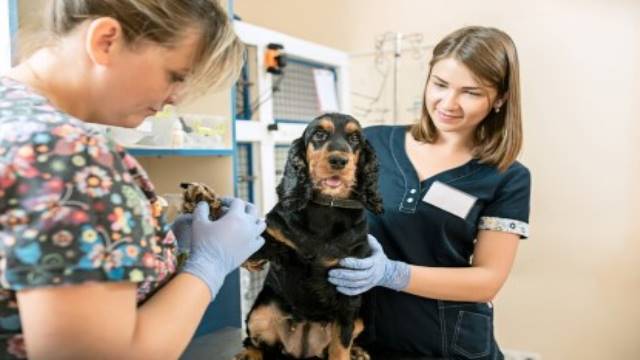Ask a Pets Doctor in Singapore: Expert Answers to Your Pet’s Health Concerns
A Growing Concern for Pet Owners
The high humidity in Singapore is a breeding ground for many fungal and bacterial illnesses which may explain why there have been so many reported cases. A lot of pet owners don’t think about this problem, yet it can have a significant effect on their pets’ health. Pets with skin allergies are becoming increasingly common. A lot of pets are showing symptoms of skin diseases every week, such as red rashes, itchy paws, and excessive scratching. Pets doctors in Singapore treat countless cases of allergies, infections, and nutritional deficiencies specific to its local conditions.
Why Pet Health Issues Are on the Rise in Singapore
Singapore’s city life, crowded housing, and warm, wet weather all make it harder for pets to stay healthy. Conditions in your area have a big impact on your pet’s health, from heat stress in brachycephalic (flat-faced) breeds to a higher chance of tick and flea infections.
What You’ll Learn Here
As a mindful pet owner, you want trustworthy, professionally supported knowledge to make sure your pet is happy and healthy. This blog will address some of the most often asked pet health questions vets come across in their work, offering sensible, evidence-based guidance catered to Singapore’s particular setting.
Parasite Prevention
Q: How can I keep Singapore’s ticks and fleas away from my pet?
A: The warm and humid weather in Singapore makes it a suitable environment for fleas and ticks to live all year. Parasites like these can give your pets skin infections, anemia, and even diseases like tick fever.
Some of the approaches you can do to mitigate them are as follows:
- Use flea and tick preventatives like oral pills, spot-on treatments, or medicated collars.
- Daily grooming and checking is important, especially after walks in grassy or wooded places.
- Maintain a clean home by regularly vacuuming floors and pet bedding to avoid pest problems.
When to See a Vet: You should take your pet to the vet if it scratches a lot, has fleas or ticks that you can see, hair loss, or red, itchy skin.
Nutrition & Diet
Q: My pet refuses dry kibble. What should I do?
A: Some pets are picky eaters, but if they suddenly refuse to eat, it could mean they are sick, in pain, or having dental problems.
Here’s how to get pets to eat:
- To make kibble taste better, mix it with a little warm water or wet food.
- Slowly switch them to a different brand if they don’t like the current one.
- Make sure your pet doesn’t get too many treats, as that can make them less hungry for normal meals.
When to See a Vet: You should take your pet to the vet if it won’t eat for more than 24 hours, throws up, has diarrhea, or loses weight.
Behavioral Health
Q: My pet suddenly stopped using the litter box. What could be wrong?
A: Stress, urinary tract diseases, or hatred of the litter box arrangement can all lead to sudden avoidance of the box.
Potential Reasons & Fix:
- Urinary pain can be brought on by kidney or bladder infections. If your pet finds regular visits to the box or straying, a vet appointment is really vital.
- Pets could react to changes in the house (new pets, remodeling, guests). One can aid by designing a quiet area with pheromone diffusers.
- Pets want calm, easily accessible, clean, odorless litter in their preferred space.
When To See a Vet: If your pet is straining, has blood in its pee, or licks its private parts too much, it may have a life-threatening urinary blockage and needs to see a vet right away.
Emergency Care
Q: My pet ate something that it shouldn’t have. What should I do?
A: Pets are usually curious and may eat anything from household items to human food that is poisonous or harmful. How dangerous it is depends on what the pet ate, how much, and how big it is.
Immediate Steps:
- Identify the substance – Was it a poisonous food (like chocolate or avocado), medicine, home chemical, or foreign object (like plastic or bones)?
- Induce puking should only be done if a vet tells you to. Corrosive chemicals are one type of substance that can do more damage if it is swallowed.
- Make an emergency call to your vet and tell them what your pet ate, how much it is thought to have eaten, and how much it weighs.
When to See a Vet: See a vet quickly if any of these things happen to your pet:
- Vomiting, diarrhea, or drooling a lot
- Lack of energy or response
- Having trouble breathing
- Belly that is swollen or signs of choking
Special Considerations in Singapore
Pet care in Singapore carries certain difficulties and obligations. Pets entering Singapore must also be vaccinated against rabies and other diseases every year. The hot and humid weather in the country makes heat stroke more likely, especially in flat-faced breeds, and makes mosquito-borne diseases like heartworm more common. Toxins that can kill pets if they lick or bite such as cane toads, are common in gardens and parks.
Housing rules also affect pet ownership. For example, HDB flats don’t allow certain dog types, and cat ownership rules aren’t always the same. Pet owners should keep a list of poison hotlines and veterinary offices that are open 24 hours a day in case of an emergency. Knowing about these things will help you keep your pets safe, healthy, and in line with local laws.
Conclusion
In Singapore, it is important to take an active role in your pet’s health by providing them with the right food, taking them to the vet often and doing preventative measures. An owner who is knowledgeable about all of their specific medical needs, from treatment for parasites to handling unexpected medical situations is the key to a happy and healthy pet. In addition to regular vet checkups and vaccines, responsible pet ownership involves being aware of local concerns including heatstroke and mosquito-borne diseases. If you ever question the health of your pet, see your veterinarian early—prevention and early intervention are absolutely vital!
–
Dr Paws Vet Care – Dr Brenda Poh
77 Lucky Heights
Lucky Court (off Upper East Coast Road)
Singapore 467626
+62 434 668



